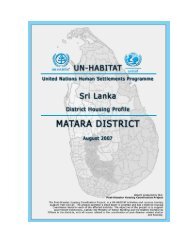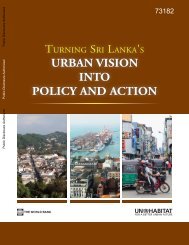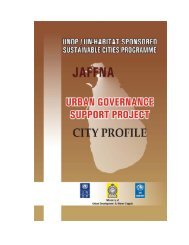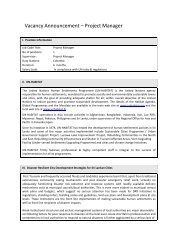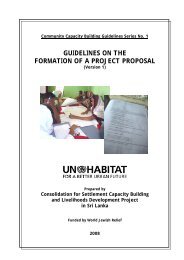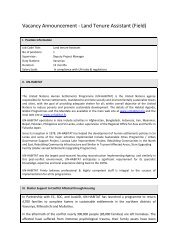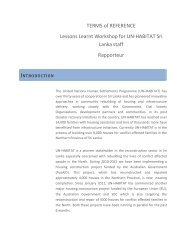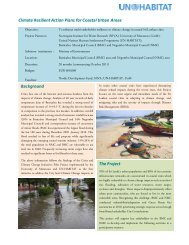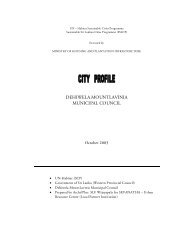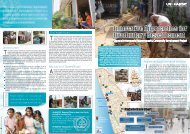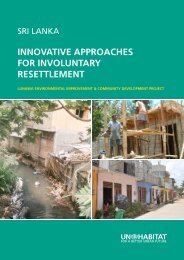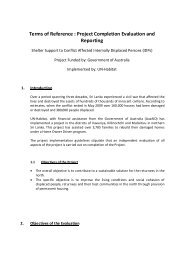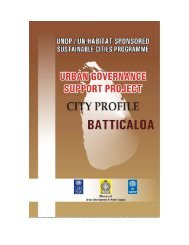Conference Proceedings : âJANASEVANAâ National ... - UN HABITAT
Conference Proceedings : âJANASEVANAâ National ... - UN HABITAT
Conference Proceedings : âJANASEVANAâ National ... - UN HABITAT
Create successful ePaper yourself
Turn your PDF publications into a flip-book with our unique Google optimized e-Paper software.
The Importance of a Regulatory Framework<br />
A regulatory framework ensures public health, safety, comfort and convenience and maintains a pleasant<br />
environment in neighborhood. It also gives people the ability to enjoy amenities and facilities, protection and security.<br />
Technical Session 1: Discussion<br />
The <strong>National</strong> Housing Development Authority (NHDA) recommended that people’s aspirations should to be taken into<br />
account when developing social housing programmes. Enumerations should be conducted to ascertain these different<br />
aspirations and how development can be undertaken within agreed guidelines. These aspects are important when<br />
designing the location of settlements/ social housing programmes. It is also necessary to take into account health and<br />
social requirements. It was mentioned that many urban problems can be solved through the creation of “mini towns”.<br />
The need for social housing in Sri Lanka was emphasised during the discussion. Social housing is needed as the market<br />
place excludes certain people – especially with regard to affordability and access to finances. Therefore, social housing<br />
is needed to cater to marginalised people.<br />
The concept of “gated communities” was discussed as this is a different aspect of housing schemes. Gated<br />
communities have been created by the private sector and caters to upper income groups. It was mentioned that<br />
housing can create divisions in society, and housing concepts such as gated communities are now being abolished in<br />
many countries.<br />
Social housing is a valuable concept. However, it should be developed within a particular framework, taking into<br />
account people’s aspirations, and legal and regulatory frameworks. Integrated settlement plans that are focused on<br />
the needs of the communities should be implemented. Issues such as the environment, safety, economic and<br />
aesthetic aspects should also be carefully considered. The Ministry was requested to conduct an interactive workshop,<br />
following the symposium, to take these concepts forward.<br />
There was some criticism with regard to implementing housing schemes/programmes without taking into account<br />
sustainability aspects. For example, giving people an eight foot approach road in a settlement does not work in the<br />
long term as it creates issues of accessing the houses and causes traffic congestion. It was stressed that housing for<br />
poor people should include all the basic amenities. Isolation of people in housing schemes was also identified as a<br />
major problem. For example in some urban housing schemes in Sri Lanka, there have been instances where local<br />
hooligans had taken over settlements and made life difficult for the householders.<br />
In his sum‐up of Technical Session 1, The Chair, Professor Siripala Hettige mentioned that several complementary<br />
perspectives can be integrated in social housing which includes economic aspects, quality of life and planning amongst<br />
others. He concluded that professionals such as architects and engineers have an important role to play in developing<br />
the social housing sector. However, he stressed that the people should not be forgotten and their desires and<br />
aspirations should be taken into account when designing social housing programmes. Hence, wide consultations with<br />
stakeholders and active public participation were recommended to take foward social housing programmes.<br />
Technical Session 2: Current Development Strategies: Policies and Sustainability<br />
Rapid urbanization and transformation from a rural to an urban life has created enormous challenges in relation to<br />
housing, land and infrastructure facilities in Sri Lanka. Moreover, recent natural disasters and the recently concluded<br />
conflict in the North and East have changed the housing agenda in the country. However, the absence of a housing<br />
policy and a national strategy has caused negative impacts on the sustainability of housing initiatives. The<br />
Government’s development policy framework “Mahinda Chintana: Vision for a New Sri Lanka, A Ten Year Horizon<br />
Development Framework 2006 – 2016” recognizes the urgent need to “make certain that policies and strategies are<br />
in place to ensure sustainable urban development”. One of the key objectives of the symposium was to revisit the<br />
<strong>Conference</strong> <strong>Proceedings</strong> – <strong>National</strong> Housing Symposium 12



